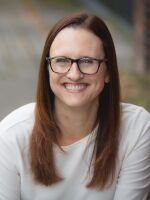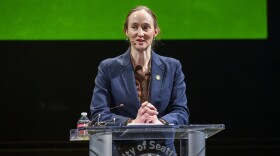Election Day is Nov. 4. Generally, this would be a local election year with races for mayor's offices, city and county councils, commissioners and school boards.
But there are a handful of special elections for legislative seats: Six of the nine races are contested.
For more, KNKX talked to Shauna Sowersby, a state politics reporter with The Seattle Times.
Click "Listen" above to hear their conversation.
Transcript
Note: This transcript is provided for reference only and may contain typos. Please confirm accuracy before quoting.
KNKX Morning Edition host Kirsten Kendrick: It looks like the most competitive legislative race is the one to fill the seat left vacant by former state lawmaker, now congresswoman, Emily Randall, in the 26th Legislative District. This is a swing district on the Kitsap Peninsula. Democratic incumbent Sen. Deb Krishnadasan is facing off against challenger Republican state Rep. Michelle Caldier. What can you tell us about this race?
Seattle Times Reporter Shauna Sowersby: I can tell you that this is a very expensive race. Michelle Caldier, who has been in office for quite some time, is getting a lot of donations, getting a lot of backing from the Republican Party, while also getting a lot of money from business-friendly interests here in Washington. Krishnadasan, on the other hand, is getting a lot of campaign contributions from several unions throughout the state, as well as other progressive members of the Legislature. And a lot of outside groups are spending big in independent expenditures — those are things like political ads that you see on TV, online or in your mailbox.
- District 26 is among the most competitive legislative races this election cycle. It's also expensive: Outside groups are spending big on political ads and donors include business-friendly interests, unions and colleagues.
- Republicans want to chip away at Democrats’ big majorities in both the House and Senate, and District 26 is their best chance to flip a seat.
Kendrick: Well, Republicans would like to chip away at Democrats’ big majorities in both the House and Senate. Is this their best chance to flip a seat?
Sowersby: Absolutely. This is one of the most purple districts in the state. Caldier also has the advantage of having name recognition, as she has been a House representative since 2015 when she defeated a Democratic incumbent with 601 votes.
Kendrick: Alright. Well, that's expected to be a close race. And we're also watching the race in the 33rd Legislative District. This is between two Democrats: incumbent Rep. Edwin Obras and Burien Mayor Kevin Schilling. Obras was appointed to replace former Rep. Tina Orwall after she was appointed to the state Senate in December. There seem to be a lot of eyes on this race, Shauna.
Sowersby: Yeah, definitely. And for good reason, this is a really interesting one. These two could not be more different as candidates, despite both being registered Democrats.
Obras is considered the more progressive candidate and voted pretty lockstep with the Democrats in the Legislature during this last legislative session. Most notably, he voted in favor of increased taxes passed this year to shore up the state's budget hole.
Schilling, meanwhile, is posing himself completely opposite to that. He's the more moderate Democrat in this race, and he says he would not be afraid to split from the Democratic Party on votes.
Most recently, I had a discussion with him; he told me that he would have voted differently on the new increased taxes, and that he hears about those taxes quite often at the door, and he finds that pretty concerning. For an odd-year election, this is also pretty expensive, but nowhere near as expensive as the race in the 26th. More progressive groups and many unions have contributed to Obras, while big businesses and conservative contributors have donated a lot to Schilling's campaign.
Kendrick: So pulling back a bit, how might the outcome of these elections affect the dynamics of the next legislative session?
Sowersby: I think we could potentially see a big shakeup if these candidates that we've just kind of discussed — if some of them get elected. They already kind of have a plan in place for forming a coalition if they get into the Senate.
Candidates like Michelle Caldier, Republican and former House member Chad Magendanz from the 5th Legislative District, and current state Rep. Amy Wallen from the 48th Legislative District, who's running for Senate, have all discussed this idea of forming something similar to a Roadkill Caucus that we saw back in 2011, 2012. They're very interested in forming this in order to kind of fight some of these more progressive votes that they don't feel really stand for people in the state of Washington in the Senate. So they're really trying to get some other Democrats and Republicans on board with this idea to fight some of these progressive votes.
Kendrick: And those two moderates, Magendanz and Wallen, are both running in King County districts. Alright, Shauna, thank you so much.
Sowersby: Thank you.
Kendrick: Shauna Sowersby covers state politics for the Seattle Times.







